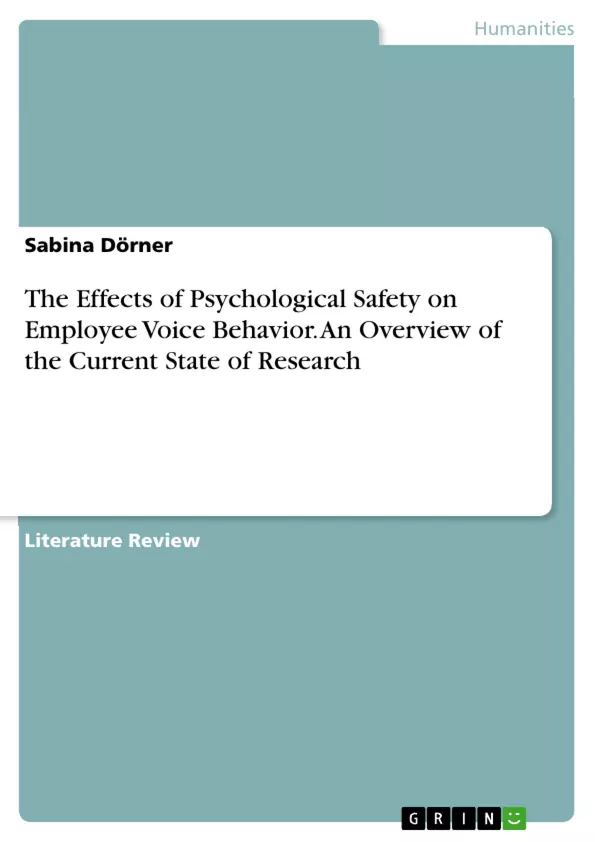This review provides an overview of the current state of research on the relationship between psychological safety and employee voice. Psychological safety is a key factor in understanding why and when employees express their opinions, share ideas, and make suggestions for improvement, which is critical to organizational learning. Over the past years, a growing body of research has examined the relationship between perceived psychological safety and employee voice behavior. Several studies demonstrated that employees are more willing to speak up when they feel safe in their work environment. Moreover, it has been shown that psychological safety reduces employee silence to some extent. Regarding the indirect effects of psychological safety, research has found that different leadership styles, behaviors, and attitudes influence perceived psychological safety, which in turn predicts whether employees engage in upward voice. Furthermore, psychological safety has been shown to mediate the effects of proactive personality congruence, peer influence, and status on employee voice. However, further studies still need to address some important questions. By giving directions for future empirical research on this topic, this review aims to contribute to a better understanding of the link between psychological safety and voice behavior.
Table of Contents
- Introduction
- Defining Psychological Safety
- Current State of Research
- Direct Effects of Psychological Safety
- Indirect Effects of Psychological Safety
- Future Directions for Psychological Safety Research
- Conclusion
Objectives and Key Themes
This paper provides an overview of the current state of research on the relationship between psychological safety and employee voice. The review aims to contribute to the literature on individual-level outcomes of psychological safety. It defines and conceptualizes psychological safety, reviews prior academic work on the main and mediating effects of psychological safety on employee voice behavior, and points out future directions for research.
- Defining and conceptualizing psychological safety as an individual phenomenon
- Examining the direct and indirect effects of psychological safety on employee voice
- Analyzing the influence of leadership styles on psychological safety and voice behavior
- Identifying future directions for research on psychological safety and its impact on employee voice
- Investigating the role of psychological safety in promoting constructive voice and mitigating employee silence
Chapter Summaries
- Introduction: This chapter introduces the importance of employee voice in today's business environment and highlights psychological safety as a critical factor influencing employees' willingness to speak up. It outlines the scope of the paper, focusing on the relationship between individual-level psychological safety and employee voice behavior.
- Defining Psychological Safety: This chapter examines the definition and conceptualization of psychological safety, contrasting individual-level and group-level perspectives. It emphasizes the key characteristic of psychological safety as the perception of taking interpersonal risks at work and differentiates it from related constructs such as psychological empowerment and trust.
- Current State of Research: This chapter reviews recent empirical studies on the effects of psychological safety on employee voice, focusing on both direct and indirect relationships. It examines the findings of studies exploring the association between perceived psychological safety and various forms of voice behavior, including promotive and prohibitive voice, constructive voice, and silence.
- Direct Effects of Psychological Safety: This section delves into studies that directly link psychological safety to employee voice. It reviews findings on the relationship between psychological safety and subordinate voice, constructive voice, and the impact of psychological safety on both promotive and prohibitive voice. It also examines the association between psychological safety and employee silence.
- Indirect Effects of Psychological Safety: This section examines the role of psychological safety as a mediator in the relationship between leadership styles and employee voice. It reviews studies exploring the impact of empowering leadership, supportive leadership, servant leadership, and authentic leadership on voice behavior through the lens of psychological safety.
Keywords
The main keywords and focus topics of this paper include psychological safety, employee voice, leadership styles, constructive voice, prohibitive voice, employee silence, empowering leadership, supportive leadership, servant leadership, authentic leadership, and organizational learning.
- Citar trabajo
- Sabina Dörner (Autor), 2021, The Effects of Psychological Safety on Employee Voice Behavior. An Overview of the Current State of Research, Múnich, GRIN Verlag, https://www.grin.com/document/1185079



